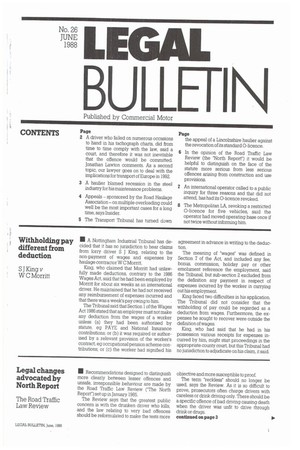Withholding pay different from deduction
Page 67

If you've noticed an error in this article please click here to report it so we can fix it.
S J King v W C Morritt
1. A Nottingham Industrial Tribunal has decided that it has no jurisdiction to hear claims from lorry driver S J King, relating to the non-payment of wages and expenses by haulage contractor W C Morritt.
King. who claimed that Morritt had unlawfully made deductions, contrary to the 1986 Wages Act, said that he had been employed by Morrill for about six weeks as an international driver. He maintained that he had not received any reimbursement of expenses incurred and that there was a week's pay owing to him.
The Tribunal said that Section 1 of the Wages Act 1986 stated that an employer must not make any deduction from the wages of a worker unless (a) they had been authorised by statute, eg PAYE and National Insurance contributions; or (b) it was required or authorised by a relevant provision of the workers contract, eg occupational pension scheme contributions; or (c) the worker had signified his agreement in advance in writing to the deduction.
The meaning of "wages" was defined in Section 7 of the Act, and included any fee, bonus, commission, holiday pay or other emolument reference the employment, said the Tribunal, but sub-section 2 excluded from the definition any payment in respect of expenses incurred by the worker in carrying out his employment.
King faced two difficulties in his application. The Tribunal did not consider that the withholding of pay could be regarded as a deduction from wages. Furthermore, the expenses he sought to recover were outside the definition of wages.
King, who had said that he had in his possession various receipts for expenses incurred by him, might start proceedings in the appropriate county court, but this Tribunal had no jurisdiction to adjudicate on his claim, it said.
















































































































